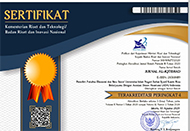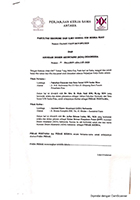MODERATION OF RELIGIOUS CONTROL ON AUDITORS' DYSFUNCTIONAL BEHAVIOR
Abstract
This study aims to analyze the effect of locus of control, professional commitment, and self-esteem on dysfunctional audit behavior and analyze the effect of locus of control, professional commitment and self-esteem on dysfunctional audit behavior moderated by religious control. The residents in this study are auditors in the Pekanbaru, Padang, Batam, and Jambi areas. The sample in this study was 84 respondents. The data analysis technique used in this study is Structural Equation Modeling (SEM) using the Partial Least Square (PLS) application. Based on the results of research, internal and external locus of control and professional commitment have no effect on dysfunctional audit behavior. Self-esteem is proven to have a significant effect on dysfunctional audit behavior. Religious control as a moderating variable is able to moderate the relationship between external locus of control on dysfunctional audit behavior but cannot moderate the relationship between internal locus of control, professional commitment, and self-esteem on dysfunctional audit behavior. The results of this study confirm that several factors can cause dysfunctional audit behavior to occur, and therefore auditing organizations (IAPI) should include training for their auditors regarding this.
Keywords
Full Text:
PDFReferences
Agoes, S. (2018). Auditing (Book 1): Practical Guidelines for Auditing Accountants by Public Accountants.
Agoes, S., & Ardana, IC (2013). Business and Professional Ethics: The Challenge of Building a Whole Human Being (Revised Edition). Salemba Empat.
Anita, R., Anugerah, R., & Zulbahridar. (2016). Analysis of Auditor Acceptance of Dysfunctional Audit Behavior: An Auditor Personal Characteristics Approach. Journal of Accounting, 4(2), 114–128.
Arifin, MA, Robiani, B., Wahyudi, T., & Fuadah, LL (2024). The Moderating Effect of Sustainable Spirituality on the Relationship between Locus of Control Auditors and Dysfunctional Audit Behavior. Journal of Systems and Management Sciences, 14(8), 492–505.
Coursey, L. E., Kenworthy, J. B., & Jones, J. R. (2013). A Meta-Analysis of the Relationship between Intrinsic Religiosity and Locus of Control. Archives for the Psychology of Religion, 35(3), 347–368. https://doi.org/10.1163/15736121-12341268
Devi, NPA, & Ramantha, I.W (2017). Time Budget Pressure, Locus of Control, Machiavellian Traits, Auditor Training as Antecedents of Auditor Dysfunctional Behavior. E-Journal of Accounting, Udayana University, 18(3), 2318–2345.
Dewayanti, DAM, Dewi, NPS, & Rustarini, NW (2022). The Influence of Authentic Leadership, Corporate Ethical Values, Time Budget Pressure and Task Complexity on Dysfunctional Auditor Behavior at Public Accounting Firms in Bali Province. Jurnal Kharisma, 4(1), 363–375.
Donnelly, D. P., Quirin, J. J., & O'Bryan, D. (2003). Attitudes Toward Dysfunctional Audit Behavior: The Effects Of Locus Of Control, Organizational Commitment, and Position. Journal of Applied Business Research (JABR), 19(1), 96–108. https://doi.org/10.19030/jabr.v19i1.2151
Fakhri Nugraha, R., Purwati, AS, & Faturokhman, A. (2021). The Effect of Time Budget Pressure, Turnover Intention, Self Esteem in Relation to Ambition, and Competency on Audit Dysfunctional Behavior. International Sustainable Competitiveness Advantage 2021, 361–372.
Hartanto, O. (2016). The Influence of Locus of Control, Time Budget Pressure, Professional Commitment on Auditor Dysfunctional Behavior. Equity: Journal of Economics and Finance, 20(4), 473–490.
Iles-Caven, Y., Gregory, S., Ellis, G., Golding, J., & Nowicki, S. (2020). The relationship between locus of control and religious behavior and beliefs in a large population of parents: an observational study. Frontiers in Psychology, 11, 1462.
Kusumastuti, R., Fernando, E., Murad, DF, Syamilah, S., & Touriano, D. (2020). The Role of Religious Control Moderation in the Relationship of Locus of Control to The Dysfunctional Audit Behavior: Evidence From Indonesian Auditors. International Journal of Advanced Science and Technology, 29(5), 11967–11976.
Libra Siagian, R., Mukhlasin, M., Reskino, R., Sitompul, R., & Akuntansi, M. (2022). The Effect of Time Budget Pressure, Task Complexity, Locus of Control, and Professional Ethics on Dysfunctional Audit Behavior. CURRENT Journal of Current Accounting and Business Studies, 3(3), 355–369.https://current.ejournal.unri.ac.id
Omer, T., Sharp, N., & Wang, D. (2018). "The Impact of Religion on the Going Concern Reporting Decisions of Local Audit Offices," Journal of Business Ethics, 149(4), 811-831.
Octavia, DI (2020). Religiosity as a Moderating Factor Affecting Dysfunctional Audit Behavior. Accounting and Management, 31(1), 15–27.
Prabangkara, S., & Fitriany, F. (2021). Factors that affect dysfunctional audit behavior: A study to understand external auditor's role as the guardians of strong and justice organizations (Goal 16 sustainable development goals). IOP Conference Series: Earth and Environmental Science, 716(1). https://doi.org/10.1088/1755-1315/716/1/012116
Prasetio, FV, Handojo, I., & Ghazi, M. (2023). The Influence of Locus of Control on Dysfunctional Audit Behavior: Religious Control as a Moderator. Media Bisnia, 15(1), 137–155.
Putri, KGA, Sisdyani, EA, Budiartha, IK, & Mimba, NPSH (2020). Auditor dysfunctional behavior mediates the effect of locus of control, turnover intention, and time budget pressure on audit quality. International Journal of Business, Economics and Management, 5(3), 189–200.
Putri, RHM (2020). Analysis of the Influence of Locus of Control and Dysfunctional Auditor Behavior on Audit Quality. Trisakti Accounting Journal, 7(1), 25–40. https://doi.org/10.25105/jat.v7i1.6178
Rahmawati, NK, & Astuti, CD (2014). The Influence of Personal Characteristics of Government Auditors on the Level of Acceptance of Behavioral Deviations in Audits. Information, Taxation, Accounting and Public Finance, 9(1), 89–106.
Rahmawati, P., & Halmawati, H. (2020). The Influence of Locus of Control and Time Budget Pressure on Auditor Dysfunctional Behavior: An Empirical Study of Public Accounting Firms in Padang City. Accounting Research Forum, 8(1), 35–49. https://doi.org/10.24036/wra.v8i1.109102
Sekaran, U., & Bougie, R. (2016). Research Methods for Business: A Skill-Building Approach (7th ed.). Wiley & Sons.
Smith, D., & Hall, M. (2008). An Empirical Examination of a Three-Component Model of Professional Commitment among Public Accountants. Behavioral Research in Accounting, 20(1), 75–92.
Srimindarti, C., Sunarto, & Widati, LW (2015). The Effects of Locus of Control and Organizational Commitment to Acceptance of Dysfunctional Audit Behavior based on The Theory of Planned Behavior. International Journal of Business, Economics and Law, 7(1).
Sujana, E., & Sawarjuwono, T. (2006). Dysfunctional Auditor Behavior: Behavior That Is Impossible to Stop. BUSINESS AND ACCOUNTING, 8(3), 247–259.
Sulistiyo, H. (2014). The Relevance of Religious Values in Preventing Dysfunctional Audit Behavior. Management Economics and Accounting, 1–13.
Sulistiyo, H., & Ghozali, I. (2017). The Role Of Religious Control In Dysfunctional Audit Behavior: An Empirical Study Of Auditors Of Public Accounting Firms In Indonesia. The Journal of Applied Business Research, 33(5), 1047–1058.
Sunyoto, Y., & Sulistiyo, H. (2019). Locus of Control, Dysfunctional Audit Behavior, and the Mediating Role of Organizational Commitment. Quality: Access to Success, 20(1), 19-24
Supriadi, I. (2023). The Mediating Effect of the Intention to Quit as the Impact of Locus of Control on Dysfunctional Audit Behavior. Ilomata International Journal of Tax and Accounting, 4(3), 599–612.
Suryandari, E. (2007). The Influence of Auditor Personal Characteristics on the Level of Acceptance of Behavioral Deviations in Auditing. In Journal of Accounting and Investment, 8 (2), 147-166
Tejo, Y.B, & Sofian, S. (2022). The Influence of Time Budget Pressure, Locus of Control, and Professional Commitment on Dysfunctional Audit Behavior. Journal of Accounting Students, 11(2), 87–95. https://doi.org/10.33508/jima.v11i2.4547
Wibowo, M.M.Y. (2015). The Influence of Locus of Control, Organizational Commitment, Performance, Turnover Intention, Time Budget Pressure, Leadership Style and Task Complexity on Auditor Dysfunctional Behavior. Journal of Business Accounting, 14(27), 92–110.
DOI: http://dx.doi.org/10.24014/jiq.v20i2.33778
Refbacks
- There are currently no refbacks.














